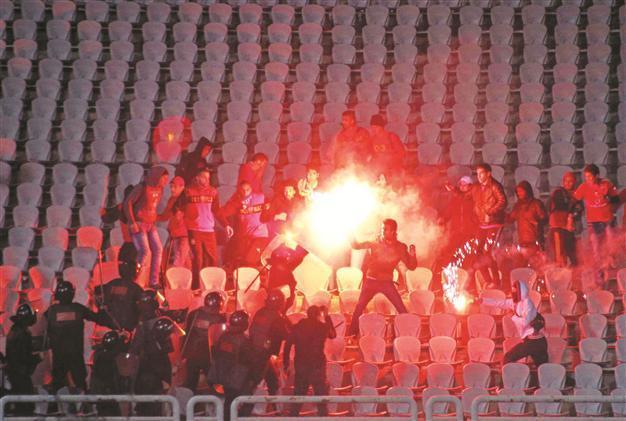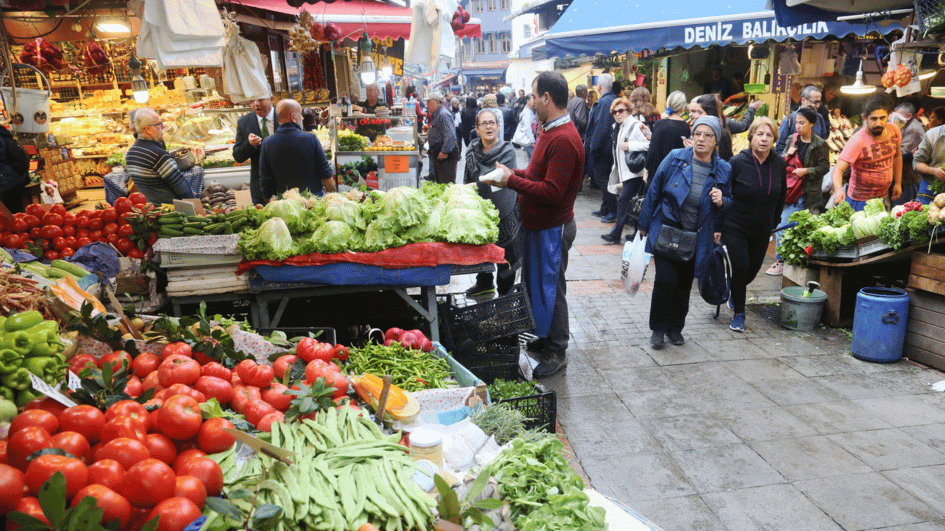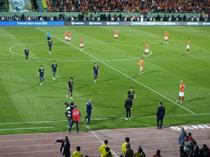Same chaos, conflicting visions
James M. Dorsey

In this file photo from Feb. 1, 2012, Egyptian fans clash with riot police following Al-Ahly’s game against Al-Masry in Port Said. AP photo
Fan violence has sparked match cancelations on both sides of the Arab-Israeli divide.The stakes for Egyptian and Israeli football fans are high – the nature of the society they want to live in and in some cases the very existence of some of their financially troubled clubs – even if the two groups are likely to agree on little more than their passion for the game.
For militant Egyptian football fans the battle is about securing the goals of last year’s popular uprising which toppled Egyptian President Hosni Mubarak, ending military rule and saving clubs from financial ruin as a result of the initial suspension and ultimate cancelation of Egypt’s top two tournaments. A majority of Egyptian fans, who favor a more pro-Palestinian Egyptian foreign policy, have little empathy for their Israeli counterparts whom they see as thugs, many of whom are racists with their anti-Arab and anti-Muslim chants.
The Egyptian view is not unfounded even if leaders of the Egyptian ultras are struggling to keep their rank and file, whose cry for dignity is often expressed in clashes with security forces under control.
Israeli football brawls over the past month ranged from pure hooliganism and violent clashes between players to attacks on Palestinians and more moderate Jews outside the confines of the stadium. Israeli Prime Minister Benjamin Netanyahu called for a crackdown on violence on the football field after fighting broke last week between players of Hapoel Ramat Gan and Bnei Lod. “If there’s violence, there will not be football. We must uproot this violence in order to return to games that spectators can enjoy – myself included,” Netanyahu was quoted as saying by the Jerusalem Post.
The incident in Ramat Gan came after thousands of Hapoel Tel Aviv fans rioted on the pitch after their team lost to Maccabi Tel Aviv. A few days later, two fans of Maccabi Petach Tikvah attempted to attack a referee. In late March a Hapoel Haifa player was hospitalized after being head-butted by a Maccabi Petach Tikvah coach and then kicked in the head by a team associate. The two most odious incidents involved militant anti-Arab fans of financially troubled Beitar Jerusalem, Netanyahu’s notorious club, in which supporters first attacked Palestinian workers and shoppers in a Jerusalem mall and later a Jewish woman who protested against their racist attitude. Police were severely criticized for failing to intervene in the mall attack.
Different situations
The situation in nationalist Israel and post-Mubarak Egypt could not be more different, the laxity of the Israeli police notwithstanding. Yet, they are similar when it comes to the lack of political will on both sides of the Egyptian-Israeli divide to tackle football violence, as well as the governments’ failure to create an environment in which politically motivated violence is viewed as unacceptable. To be sure, the Israeli Football Association (IFA) has responded firmly to player violence but despite being the only football body in the Middle East and North Africa to have launched an anti-racist campaign, it has been lenient in meting out punishments for politically motivated violence.
The IFA last month reduced Beitar’s punishment for football violence from three home games at a neutral site and one behind closed doors. With the worst disciplinary record in the Premier League, Beitar has faced more than 20 hearings since 2005 and has received various punishments because of its fans’ racism.
Beitar’s matches often resemble a Middle Eastern battlefield. It’s mostly Sephardic fans of Middle Eastern and North African origin who revel in their status as the bad boys of Israeli football. Their dislike of Ashkenazi Jews of Eastern European extraction rivals their disdain for Palestinians. Supported by right-wing Israeli leaders, Beitar traces its roots to a revanchist Zionist youth movement. Its founding players actively resisted the pre-state British mandate authorities. Beitar is Israel’s only leading club never to have signed an Israeli-Palestinian player because of fan pressure.
By contrast, Egyptian teams which are already reeling from the cancelation of the Premier League in February following the death of 74 fans in a brawl in the Suez Canal city of Port Said, fear financial disaster as a result of the annulment of the Egypt Cup.
Egypt still reeling
The Egyptian Football Association (EFA) appealed unsuccessfully to the country’s military rulers, the Supreme Council of the Armed Forces (SCAF), to step in after a refusal by the Interior Ministry, which controls the police and the security forces. The refusal was prompted by the security forces’ reluctance to engage with football fans because clashes would further damage their tarnished image as the executioners of the former Mubarak regime and the military.
Granted, the Israeli police do not have the problems their Egyptian counterparts do. But if the stakes in Egypt are a more transparent, more accountable society, in Israel they are the very democracy that the Jewish state prides itself on, which increasingly is less based on tolerance and respect for diverging opinions and ethnic and religious minorities and ever more so on intolerance and the brutalizing effects of 45 years of occupation of Palestinian lands.
The battles in Egypt and Israel are fought on multiple battlefields of which football is an important one. That puts the onus not only on governments, but also on football associations, club management and FIFA, which for all practical matters has looked the other way so far by issuing lame protests at best, which are ignored by Israelis and Egyptians because there is no price to pay.
With an inept military more concerned about its perks than the country’s future in charge in Egypt and an Israeli government that includes many Beitar Jerusalem supporters, little can be expected beyond at best demands for law enforcement from the highest authority in the country.
That means that the national football federations, FIFA and the regional associations, the Union of European Football Associations (UEFA) and the Confederation of African Football (CAF), need to step up to the plate more than ever.
















